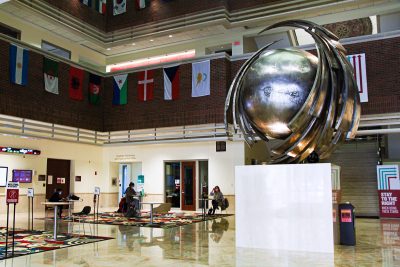As discussions about anti-Asian discrimination surge in the United States, so too are conversations concerning safe spaces and minority representation in higher education.

One group, the newly created South Asian Student Association, aims to do just that by improving South Asian students’ collective voice on Boston University’s campus.
Founded by Salloni Sunderaj, a freshman in the College of Arts and Sciences, and Anya Sachdev, a CAS sophomore and recent transfer, the South Asian Student Association is a cultural club fostering community and giving voice to BU students with South Asian heritage.
The club hopes to provide South Asian students the opportunity to build connections with people from similar backgrounds and have a supportive space to discuss community issues, Sachdev said.
Sunderaj added she wants the club to reflect the community on campus, as well as help students adjust to the “huge culture shock” after coming to the United States.
“The South Asian community is very focused on creating bonds and maintaining those values, so we wanted to have that on our campus,” she said, “because these are also things that [Sachdev] and I believe in very strongly.”
Both club leaders are new to campus this year, and Sunderaj said they felt intimidated by the unfamiliar environment. As a result, the pair decided to start a club where both current and incoming students had a community on campus and could meet people with shared cultures and experiences.
“Starting school in a pandemic, in a completely new place, was very intimidating and we wanted to find a space where we felt represented,” she said. “Since we could not find a community that we completely identified with, we took the initiative to create one ourselves.”
Sachdev said the club specifically wants to represent Bangladesh, Afghanistan, the Maldives, Pakistan, Bhutan, India, Sri Lanka and Nepal. The club launched its Instagram account March 12.
Sachdev, who transferred from Bryn Mawr College last Fall, said having lived outside the United States, she realized how much it meant for her to have a community at BU she could culturally identify with.
“When I came back to the U.S., it made me realize how important being around other South Asians and learning from them and interacting with them [was],” Sachdeb said. “Like how strong of a bond it was and how important it was.”
Sunderaj said the club is currently in the process of growing their e-board with diversity and inclusivity in mind and becoming officially established. SASA is also in the process of recruiting members, and while Sunderaj said they have encountered some difficulties, she said COVID-19 has actually aided in the outreach process.
“I think that the pandemic has actually helped,” Sunderaj said, “because I think people are still trying to find that sense of community.”
Some of the club’s plans are “very ambitious,” Sunderaj said — they hope to host activities in the professional, social and community service fields. For example, she said they’d like to organize discussions with South Asian professionals, particularly those in STEM, and talks about stigma in the arts.
Another goal is to support the LGBTQ community in South Asia and collaborate with organizations such as South Asian Americans Leading Together, a nonprofit that aims to raise awareness and promote racial equality, and ASHA for Women, an organization working to help South Asian women in abusive situations.
“There’s a lot of things that we’re very interested in,” Sunderaj said. “We want to talk about some very difficult issues such as sexism, anti-Blackness, stigmas, colorism in the South Asian community, and we want to discuss how we can be better as individuals living here.”
Muskaan Khemani, a junior in CAS, said she thinks having a club for South Asian students is “much needed.” As a South Asian student, she said having representation in topics such as racism is necessary for the community, and something that’s been lacking.
“I remember there was this talk about colorism amongst a few student groups when I was a sophomore,” Khemani said. “There was no South Asian representation, even though colorism, I would consider, is a very important and big issue in South Asia due to the colonial history and the ingrained racism due to that.”
Sachdev added SASA plans to host different activities to connect students with their cultural heritage.
“It’s kind of just like forming bonds, interacting with other South Asian students and their experiences,” she said. “Talking about our different family experiences and different traumas that can arise from that.”
Khemani said creating a community that includes all South Asian students is necessary for those who may feel as if they do not belong in other, more broad Asian communities on campus, such as the BU Asian Student Union.
“I think it’s a very cool group but sometimes as a South Asian, I’m not sure if I fit into that,” Khemani said. “There is this big gap for South Asians that I think me and my South Asian friends can attest to, and so I think this group is filling that gap, hopefully.”
Sunderaj said diversity in South Asian representation on campus is critical for community comfort.
“We’re trying to add a new element to BU’s already very diverse community,” she said. “We think that creating this sense of relatability and having that space for people with a South Asian background to have that sense of belonging is extremely important.”






















































































































